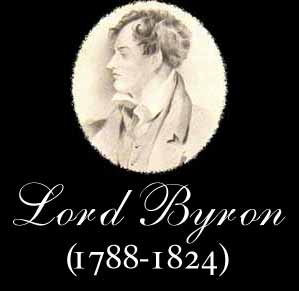
LORD BYRON TELLS THE COUNTESS GUICCIOLI THAT HE CANNOT
CEASE TO LOVE HER


Teresa, Countess Guiccioli, at sixteen had married an old and wealthy Italian nobleman. She was golden-haired, poised, well-read, and gentle. In 1819, when she was eighteen and he thirty-one, Byron met her and fell passionately in love.
Here is one of his letters to her:
"...my destiny rests with you..."
Bologna, August 25, 1819 MY DEAREST THERESA, - I have read this book in your garden: - my love, you were absent, or else I could not have read it. It is a favorite book of mine. You will not understand these English words, and others will not understand them, - which is the reason I have not scrawled them in Italian. But you will recognize the handwriting of him who passionately loved you, and you will divine that, over a book that was yours, he could only think of love.
In that word, beautiful in all languages, but most so in yours - Amor mio - is comprised my existence here and thereafter. I feel I exist here, and I feel that I shall exist hereafter, - to what purpose you will decide; my destiny rests with you, and you are a woman, eighteen years of age, and two out of a convent, I wish you had stayed there, with all my heart, - or at least, that I had never met you in your married state.
But all this is too late. I love you, and you love me, - at least, you say so, and act as if you did so, which last is a great consolation in all events. But I more than love you, and cannot cease to love you.
Think of me, sometimes, when the Alps and ocean divide us, - but they never will, unless you wish it.
Byron